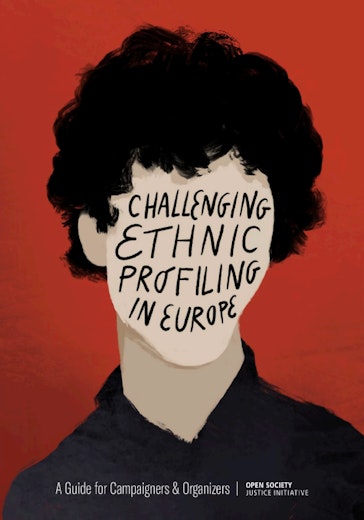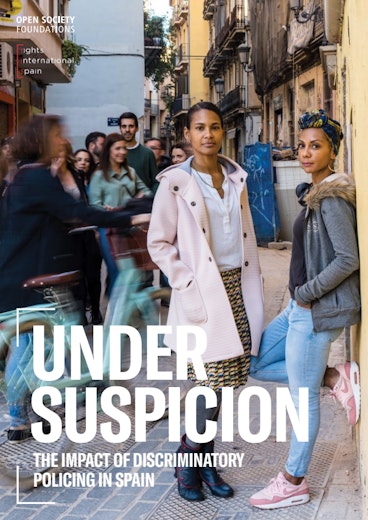A Divided ECtHR Fails Victims of Discriminatory ID Checks In Spain, Argue Human Rights Groups
SOS Racisme Catalunya, the Open Society Justice Initiative, and Rights International Spain (RIS) are deeply concerned about today’s decision from the European Court of Human Rights (ECtHR) in the case of Zeshan Muhammed v Spain. A deeply divided court found by four votes in favour and three against that there was no violation of the prohibition of discrimination.
Pursuant to this decision, the Justice Initiative and SOS Racisme are considering asking the Grand Chamber, a 17-judge panel, the highest body at the ECtHR, to examine the case, as the decision raises serious questions affecting the interpretation of the European Convention on Human Rights (ECHR).
The groups argue that the court demonstrated a lack of understanding of the nature and harm of discriminatory ID checks, and also misinterpreted the Convention’s prohibition of discrimination.
Mercedes Melon, senior lawyer at the Justice Initiative and lawyer in the case commented: “This decision is a significant setback for the many victims of discrimination in Spain who had placed their hopes in the ECHR to help bring an end to police ethnic profiling in the country.”
In May 2013, National Police officers stopped Zeshan Muhammad and a friend, both visible minorities, and requested Muhammed’s identification. When Muhammad asked about the reason for the identity check, the officer responded that he had stopped him because of his ethnicity. Muhammad proceeded to file an administrative claim within the Spanish legal system with the support of the Open Society Justice Initiative and SOS Racisme Catalunya, and, in 2017, made a complaint to the ECtHR so that, in his words, “no one else may be stopped and identified by the police solely because of their skin colour.” RIS filed a third-party intervention providing standards and best practices to combat police ethnic profiling.
The case was brought with the aim of overturning a nearly 20-year-old, archaic Spanish Constitutional Court decision in the case of Rosalind Williams v. Spain that established that a person can be stopped by the police for identity checks on the basis of skin color under the assumption that Spanish citizens are normally white. The Justice Initiative argued that this constitutes direct discrimination.
This ruling was criticized in 2009 by the Human Rights Committee (HRC) and, so far, the Spanish government has not complied with United Nations Human Rights Council’s recommendations to amend the law to prohibit racial discrimination by police officers and "take all necessary measures” to prevent racial discrimination by officials. Numerous human rights bodies of the Council of Europe, the UN, and the EU, as well as civil society organizations, have consistently demanded the adoption of those measures.
Although the Constitutional Court decision in Rosalind Williams v. Spain enables discriminatory police ID checks, as recognized by the European Commission against Racism and Intolerance (ECRI) and the UN, today’s decision by the ECtHR, in a glaring omission, does not mention Rosalind Williams v. Spain as part of Spanish legal regime, and the government continues to argue that the legal system provides sufficient protection against racial and ethnic discrimination.
Marilda Sueiras, a lawyer with SOS Racisme, noted: “This decision ignores the unequal conditions between litigants and facilitates institutional impunity as well as the lack of protection for victims of racist police practices.”
The decision handed down in Zeshan Muhammed v Spain comes on the same day as an ECtHR ruling was published in the case of Basu v. Germany concerning a discriminatory police ID check. In the ruling, the court found that discrimination occurred, highlighting the fact that, because an investigation into the incident was conducted by authorities that had hierarchical and institutional connections to the police officer under investigation, it was not impartial nor independent. The finding against Germany also noted that domestic courts failed to take necessary evidence into consideration, in particular, failing to hear witnesses who were present during the identity check.
Given its parallels to the case of Zeshan Muhammed v Spain at least in those two aspects, the NGOs supporting the case decry the incoherence of the case’s negative outcome. Indeed, the dissenting opinions in Zeshan Muhammed v Spain consider that there was not a sufficient, effective, and independent investigation into the incident of ethnic profiling targeting Muhammed and that not all evidence in the case were taken into consideration, including witness testimony from the scene where Muhammed was stopped by police. One dissenting opinion also expresses regret that the ECtHR’s decision does not examine whether the Spanish legal system provides adequate protection against discriminatory ID checks conducted by police.
“The ECtHR’s ruling shows obstacles faced by victims of discriminatory ID checks when seeking justice," said Youssef Ouled of RIS. "It is essential to review the Spanish legal system and implement a series of measures to safeguard against discriminatory ID checks. This is the only way to ensure that investigations are truly effective, sufficient, and independent.”
Related Work
Zeshan Muhammad v. Spain
Ethnic profiling by law enforcement officers continues to be a persistent and pervasive practice throughout Spain, particularly in the context of immigration control.
Challenging Ethnic Profiling in Europe: A Guide for Campaigners and Organizers
This guide provides an international overview of how to challenge and end ethnic profiling, distilling key lessons and strategic insights learned from over a decade of work on the ground.

Under Suspicion: Speaking Out about Ethnic Profiling in Spain
Ethnic profiling is common in Spain. Research consistently shows that police disproportionately stop and check minority groups throughout the country.
